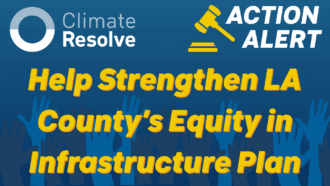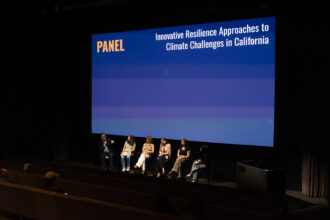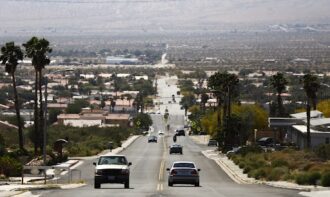A standing-room only crowd assembled in the Tom Bradley Room of Los Angeles City Hall on Thursday, June 25, for the launch of “Path to Positive: Los Angeles—Leveraging Regional Action for Global Impact on Climate Solutions,” an initiative jointly organized by the nonprofits Climate Resolve and ecoAmerica.
Path to Positive: Los Angeles is a project to empower local leaders in five sectors—faith, health, business, higher education, and local municipalities—to engage Angelenos in climate solutions. For the three-year initiative, ecoAmerica and Climate Resolve will support the leaders and organizations who sign up with monthly webinars and other online resources targeted to their sectors. Also announced at the event: a Path to Positive conference on November 6, 2015 at the Cathedral of Los Angeles.
“It’s not just environmentalists that are going to lead on climate change—it’s everyone,” said Jonathan Parfrey, Executive Director of Climate Resolve. “When we focus on communities, we can engage Angelenos on support for policy solutions and public action at the state and local level.”
Among the local officials who spoke about collective efforts to tackle climate change in Los Angeles and Southern California: Long Beach Mayor Robert Garcia; State of California Treasurer John Chiang; State of California Controller Betty Yee; Los Angeles City Attorney Mike Feuer; and Los Angeles City Controller Ron Galperin. Mayor Garcia discussed the greening of the Port of Long Beach and the city’s soon-to-be introduced sustainability plan, adding that the most exciting element was its focus to “make Long Beach a climate-resilient city.”
“We need to convert climate change from special interest to public interest,” said Bob Perkowitz, President of ecoAmerica. “With Path to Positive, we are trying to use LA as an example for the rest of the world. It’s encouraging that 100 have already signed on.”
Nurit Katz, the Chief Sustainability Officer at UCLA, was among those representing higher education and spoke about schools being “a living laboratory for sustainability.” Allis Druffel of Interfaith Power & Light took the opportunity to discuss how the Pope’s encyclical is “about people and how we treat the poor and vulnerable among us.” To that point, Malcolm Carson of Community Health Councils discussed the issue from a health frame, pointing out that communities that contribute the least to climate change often suffer the most from the urban heat island effect. On the business front, Tom Bowman, a member of the California Business Alliance for a Clean Economy, shared his own success in making climate change central to business—”cutting emissions and saving money while doing it.”



